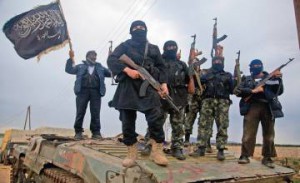Even as Kashmir faces a prolonged period of unrest, it has to be remembered that the outbreak is not communal in nature. Hindu-Muslim animosity has nothing to do with it even if several Kashmiri Pandit families have left the Valley in recent weeks, recalling an earlier exodus. But their departure is because of the prevailing violence and not because they felt unwanted as a community.
Kashmir is a classical case of an area where the dissatisfaction with the central authorities is high because of various reasons, including instigation by Pakistan. But the jehadis are mostly the psychopaths who enter Kashmir from Pakistan with the arms and theocratic motivation provided by the army and the Inter-Services Intelligence (ISI) of Pakistan.
Those Kashmiris who take up arms, like Burhan Wani, may be terrorists, but they are like the Maoist insurgents and not the crazed killers of ISIS waging a religious war. Wani was not for the establishment of a medieval Caliphate in Kashmir, as the ISIS wants, but “freedom” from Indian rule.
The distinction is important because it points to the fact that notwithstanding a few misguided Muslim young men (and fewer women) running away from home to join the ISIS, the community itself has overwhelmingly rejected the concept of terrorism.
True, there are a number of home-grown extremist outfits such as the Indian Mujahideen and SIMI (Students Islamic Movement of India). But their total membership must be well below a thousand. Moreover, one doesn’t hear of them any more.
It is also undeniable that their family members are invariably against their involvement in extremism even if the elders are not always able to stop them from straying into militancy.
What is more, these outfits do not pose any major threat. Arguably, the Indian security agencies have been far more successful than their counterparts in Bangladesh or France to defang them by tracking them down.
But the success of the security agencies — fingers crossed ! — is not the only reason why Indian Muslims have stuck to the straight and narrow path of moral, ideological and political rectitude. What is primarily responsible for dissuading them from joining the terrorists is the secular space provided by India’s multicultural society.
As a result, even if the Muslims experience more indigence and unemployment than any other community except the Adivasis or Scheduled Tribes they do not consider the scene to be hopeless. Indeed, Narendra Modi’s pitch for development has undoubtedly induced a sizable number of Muslims to repose their faith in India’s future.
Their assimilation in a pluralistic society is another reason why they have no time for terrorism. Unlike in the West, they do not see themselves as second class citizens in India even as they share their deprivations with the Dalits and Adivasis. But they are aware that as the country progresses, their economic and social status will improve.
In addition, unlike in the West, a fair number of Muslims has already broken through the glass ceiling to join the ranks of the rich and famous. Among them are film stars — the celebrated Khans, Shah Rukh, Salman and Aamir — sportsmen and women (Sania Mirza) and singers. They act as role models for young Muslim men and women, assuring them of a bright future with hard work and luck.
This isn’t the case in the West where even the second and third-generation Muslims have hardly any hope of rising to the top, except for rare exceptions like the Mayor of London, Sadiq Khan. Otherwise, the constant humiliation of being looked down upon by the whites combined with the tedium and ennui of daily life and the lure of adventurism garnished with pseudo-religious dogma make ISIS an attractive alternative.
The motivations are different in Pakistan and Bangladesh. In the former, the deep dislike for India caused by the latter’s role in breaking Pakistan into two in 1971 and maintaining its hold on Kashmir has compelled Islamabad to use terror as a weapon of war.
In Bangladesh, the spells of military rule and the perpetual enmity between the two major parties — the Awami League and the Bangladesh Nationalist Party — has enabled the fundamentalists to take root and indulge in mayhem like killing
liberal bloggers and Hindu priests and attacking foreigners in restaurants. In India, too, the Hindu Right has killed rationalists like Narendra Dabhokar and suspected beef-eaters. It is also possible that their depredations make the hotheads in the Muslim community to think of retaliation. But the likelihood of Islamic fundamentalism making its presence felt in a big way in India is remote.
George Bush was among those who marvelled over the fact that virtually no Indian Muslim had joined the Al Qaida. The reason, as he must have known, was democracy unlike the repressed societies in West Asia which made young people take up the gun to fight both America and the local dictators.
The threat to India is not from the Islamists but from the Maoists, as former prime minister Manmohan Singh once said. But the latter, too, must have realized by now that their dream of establishing a proletarian dictatorship is unlikely to be fulfilled. Theirs is also a lost cause, like that of the Islamists.
thestatesman.com



